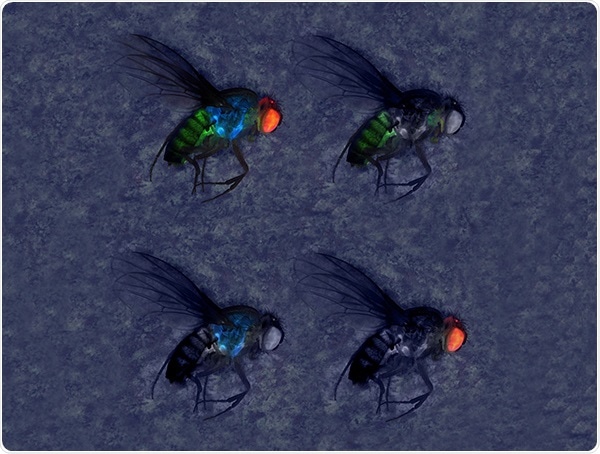Robust new genetic engineering techniques have given researchers the ability to transform many sectors of global urgency.

The split-drive system was developed so transgenes could be naturally separated. The top left fly carries three transgenes, the others only carry one. This is seen by the appearance of distinct fluorescent body parts. Image Credit: Gerard Terradas, University of California, San Diego.
The supposed gene drives, which exploit CRISPR technology to affect genetic inheritance, show the potential to quickly spread particular genetic traits across the populations of a specified species.
For instance, gene-drive technologies used on insects are being developed to stop the spread of devastating diseases, like dengue and malaria, by inhibiting mosquito hosts from becoming infected. Gene-drives are being designed in agricultural fields to help regulate or remove economically damaging crop pests.
But together with the potential to modify populations, there have been concerns about the long-term impacts of these transformative novel technologies in the wild. Both scientists and ethicists have queried about how the so-called gene drives, once turned loose in a regional population, can be controlled if required.
Scientists from the University of California San Diego (UC San Diego), Tata Institute for Genetics and Society (TIGS) at UC San Diego, and their collaborators at UC Berkeley have now designed a new technique that gives more control over the release of gene drives. Information about the new “split drive” was published in the Nature Communications and eLife journals on March 5th, 2021.
The most familiar gene drives use a two-component system that includes a DNA-cutting enzyme (known as Cas9) and a direct RNA (also called gRNA) that targets cuts at particular sites in the genome. After the splicing of the Cas9/gRNA, the gene drive, together with the cargo carried by it, is replicated into the break site via a DNA repair process.
Although traditional gene drives have been developed to spread independently, the recently developed system has been designed with controls that isolate the genetic implementation processes.
The split-drive system contains a non-spreadable Cas9 component embedded into a single site in the genome and a second genetic element that can replicate itself—together with an advantageous trait—at a separate location.
When both elements are collectively present in an individual, an “active gene drive” is produced that distributes the element that carries the beneficial feature to most of its progeny. However, when uncoupled, the genetic element carrying the beneficial trait is inherited under normal generational genetics rules, or Mendelian frequencies, instead of spreading uncontrollably.
As explained in the Nature Communications journal, by generating slight fitness costs that ultimately remove the Cas9 enzyme from the population, the split-drive system extremely increases the safety and control of the genetic deployments.
Studying drives in essential genes is not a novel idea, per se, but we observed that certain split situations were able to spread a cargo effectively upon a first introduction while leaving no trace of Cas9 after a few generations, as well as few mistakes in the DNA repair process that got rapidly diluted out.”
Gerard Terradas, Postdoctoral Scholar, Division of Biological Sciences, University of California, San Diego
Terradas is also the first author of the study published in the Nature Communications journal.
The new article also explains the benefits of how gene drives are perceived by the general public, as efforts to modify wild populations could be flexibly developed in numerous ways based on the required result.
The novel split-drive system follows the study declared in September 2020, in which the UC San Diego team headed the development of two novel active genetics neutralizing methods that are developed to either inactivate or halt the gene drives released in the wild populations.
We hope that the flexible design features we have developed will be broadly applicable by enabling tailored approaches to controlling insect vectors and pests in diverse contexts.”
Ethan Bier, Distinguished Professor and Science Director, Tata Institute for Genetics and Society and University of California, San Diego
Bier is also the senior author of the Nature Communications study.
These seminal papers reflect a tremendous effort, and fruitful cross-UC collaborations, to demonstrate novel gene drive architectures for mitigating the formation of resistant alleles while providing a safe confinable means for modification of wild populations.”
Omar Akbari, Associate Professor, University of California, San Diego
Akbari is also the senior author of the study published in the eLife journal.
Source:
Journal reference:
Terradas, G., et al. (2021) Inherently confinable split-drive systems in Drosophila. Nature Communications. doi.org/10.1038/s41467-021-21771-7.